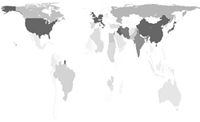Via Savage Minds came another mapping idea:
| Vanishing Point consists of a map of the world connected to a database fed by news coming from several international newspapers. The visibility of each country on the map results from the quantity of media coverage the country receives, so those countries that do not make the news disappear progressively. |  |
The same post also mentions the expression of ‘bridge bloggers’ a term E.Zuckerman uses to describe bloggers who are able to cross not only a linguistic divide, but also a cultural one. I am not sure if the quoted explanation really captures the intended meaning, as it sounds more like an almost general description:
Nevertheless E.Zuckerman’s recent posts on an analysis of links connecting to Global Voices point a bit more specicly to the assumed intention:
…. is an international effort to diversify the conversation taking place online by involving speakers from around the world, and developing tools, institutions and relationships to help make these voices heard.
That’s a very positive view but I would agree to the comment on Savage Minds that ‘bridge bloggers’ often only cross national boundaries – not those boundaries of class, race and gender ….. So it is not just the question to cross national borders, if they at all should be reestablished in cyberspace, but more likely one of language. As much as a global language is desired the implementation of one immediately challenges the task how to keep diversity alive within some necessarily dominating forms of expression.
It is not so much posing this question for this blog as it is run in english because of a conviction to get involved into broader possibilities of bidirectional exchange. In consequence it means that I assume some national languages (for myself ) as to limiting for the communicational demands of a wider access to views and voices … But there is also a uniqueness in the original pronunciation of a voice’s language, thus I would not blame anyone for blogging in one’s own tongue. It is more likely a general question into the intention of blogging and its possibilities, which here definitely follows an interesting route nevertheless according to the inherent capabilities one wishes it to continue across further borderlines …
